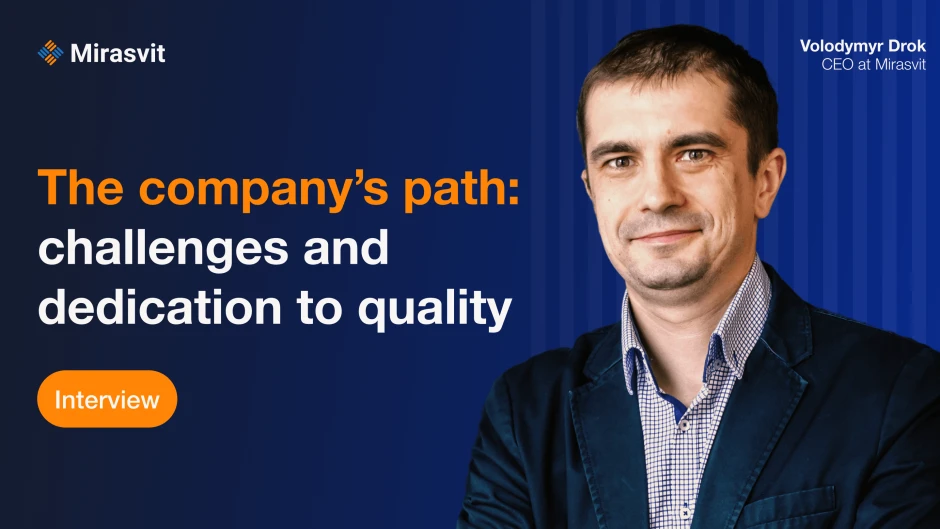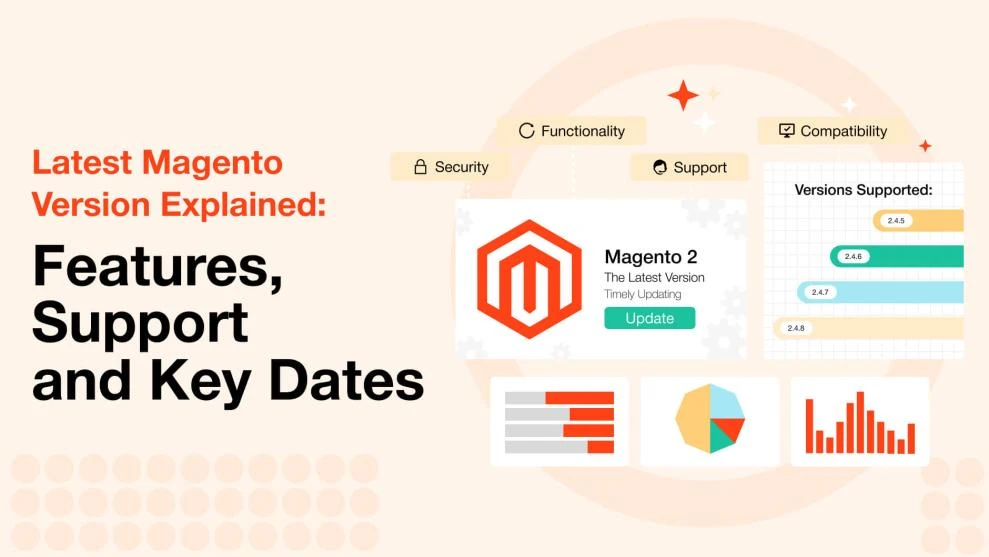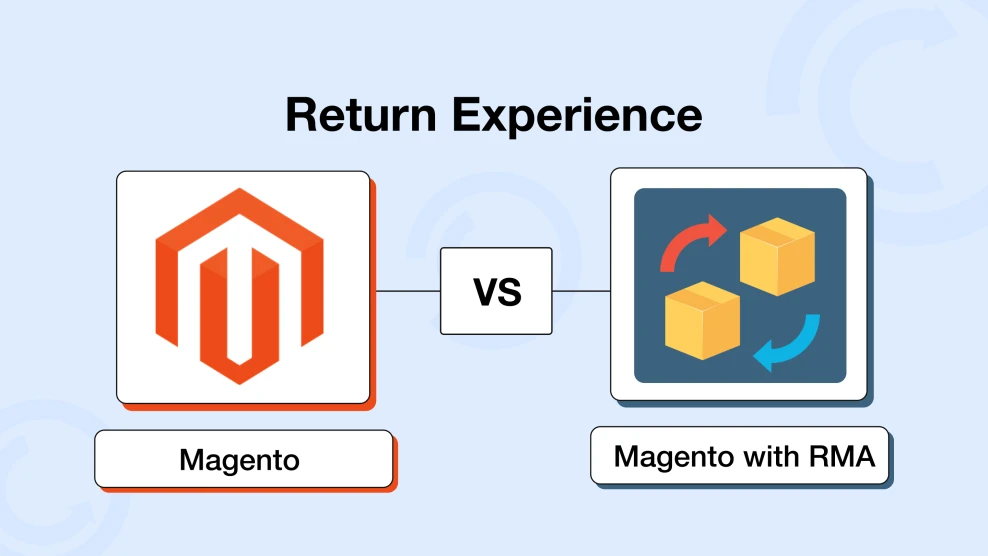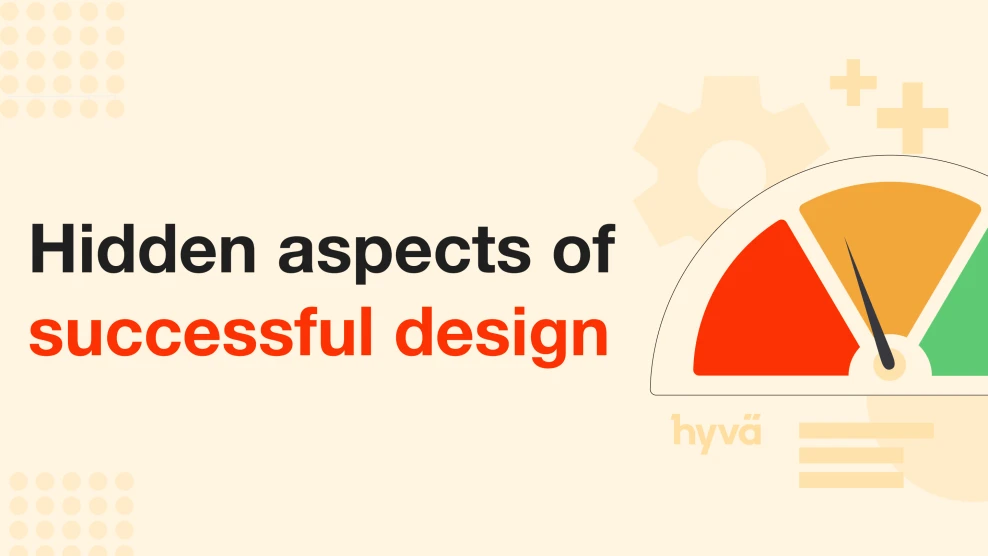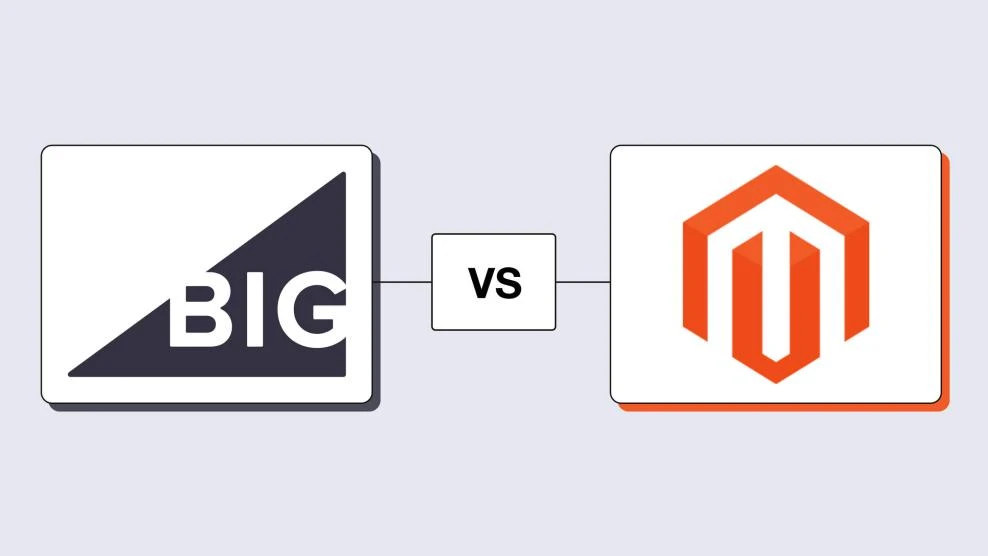Mirasvit's Journey — Interview with CEO
-
 Vera Sturdy
Vera Sturdy
- Our News & Updates
- 24 min read
Over the past 17 years, Mirasvit has evolved from a small team of developers into a global provider of e-commerce solutions, trusted by over 50,000 stores across 125 countries.
In this interview, we talk with founder Volodymyr Drok about how the company moved from custom web projects to creating leading products for Magento and Shopify. We'll dive into why Mirasvit prioritizes product quality over advertising, how they successfully expanded into international markets, and the growth of their team, which started with just a few people in a small office and has now become an international operation.
We’ll also uncover how customer feedback has shaped their innovations and how building strong, long-term relationships with clients has set them apart in the competitive e-commerce landscape.
Volodymyr, please tell us about your professional journey before founding Mirasvit.
I graduated from Kyiv Polytechnic Institute with a degree in Applied Mathematics and began my career as a software developer.
In addition to development, I also worked as a product manager and marketer, first for a trade and distribution company and later in the IT sector. I’ve always been curious about how businesses operate, and as a manager, I had the chance to observe how others build and manage their ventures.
At the same time, I studied at the Faculty of Finance to better understand accounting and other business aspects. However, no amount of formal education can fully prepare you for sales and business management. This knowledge develops gradually through hands-on practice, real-world work, and learning from interactions with others.
Several entrepreneurial attempts were made. One of the first was opening a mobile phone shop with a friend. He promised to handle the supply chain, but he couldn’t deliver the products when orders started coming in, so we had to shut down the project.
What motivated you to start Mirasvit?
From a young age, my brother Oleksandr and I always looked for ways to earn money independently, so the idea of starting our own business was a natural extension of that drive. The only question was what exactly to focus on.
At the time, my brother had already graduated from university and worked as a software developer, just like me. We decided to begin with something we were familiar with—custom development of small web projects.
We started by taking on small projects. I arranged the meetings, and my brother would pitch our services. After a while, when we had secured enough orders to last us several months, I left my full-time job. We rented our first office—a small room in a building where we now occupy the entire space.
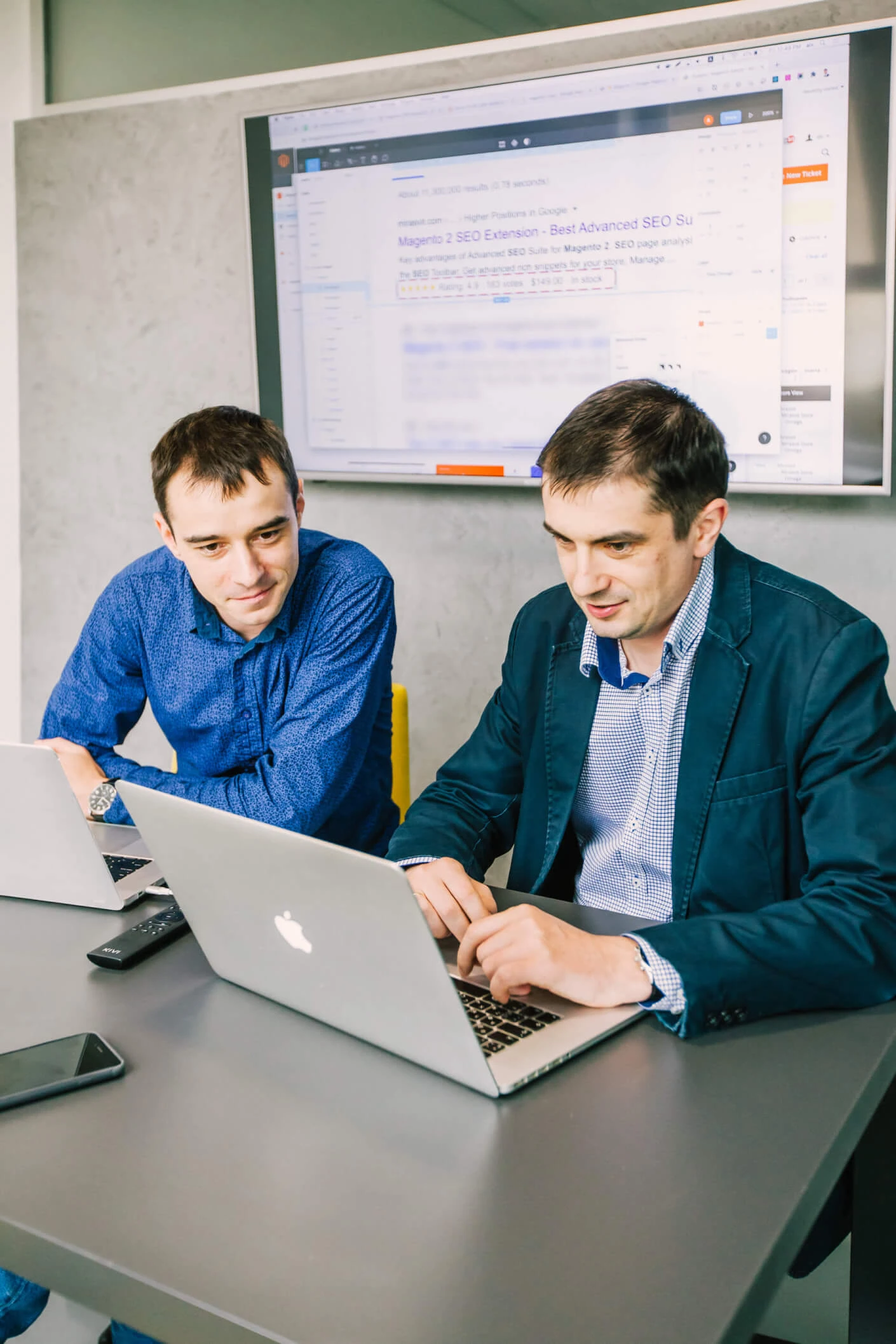
What challenges did you face, and what did you need to quickly learn when founding Mirasvit?
We knew how to program but had no clue how to build a company. In 2008, there wasn’t the same easy access to information as there is today. There was no YouTube video with endless tutorials or affordable business books to help you understand the basics of running a business. Even the books I did manage to find often felt empty and provided little real value. It gave me the impression that business literature was all fluff, without concrete advice.
So we had to learn on the go, coming up with solutions or piecing together ideas by observing how others did it.
"The primary source of knowledge became our own experience. We simply dove in, tried things out, made mistakes, and learned from them."
It was a bit easier for us because we were developers, meaning we could implement projects without significant financial risks. If something didn’t work out, we’d move on and try something new.
What was the company's initial concept?
When we started, we didn’t have a clear specialization—we took on any programming-related work, looked for clients on freelance platforms, and handled various projects. However, it quickly became clear that we needed to specialize to grow and develop the company. It’s impossible to be a jack-of-all-trades; you must find your niche.
Our options were limited: either simple websites, which everyone was making, or more complex systems like e-commerce platforms. Initially, we focused on website development because it was the most in-demand segment, and finding clients in that area was easier.
But soon, we realized that creating basic websites wasn’t fulfilling for us. Those projects tended to emphasize design and marketing, while we were more drawn to the technical, complex aspects of the work.
"We wanted to work on something that played to our strengths and kept us interested, so naturally, we shifted toward e-commerce platforms."
At that time, CMS Bitrix was the leading platform for online stores in our region. We became their partners and started offering our services to their clients.
Who were your first clients, and how did you find them?
Our first major client was the online store Repka.ua. Like us, they were a startup starting from scratch. They didn’t have large budgets but had immense enthusiasm and a desire to create a quality product. They believed in us, and we put everything we had into their project.
I remember launching their store in December, right before the New Year. It was a tense time—many things didn’t go smoothly at first, and I was constantly getting calls from the director, who was very worried because the entire business was on the line.
But it all worked out. The launch was a success, and soon, the store became one of the leaders in the Ukrainian market. It was a long-term project in which we grew alongside the client, supporting them at every stage of their development.
After completing several successful projects, attracting new clients became much easier.
First, we had a portfolio of our work to show. Among our early successful projects was the online store DKT.ua, one of the largest in Ukraine at the time.
Secondly, we soon became a Gold Partner of Bitrix, and the platform would refer potential clients to us.
We also had our website showcasing case studies of our projects. We actively participated in tenders for e-commerce development in Ukraine, which helped us find new clients.
Why did you decide to focus on the Magento platform in 2009?
Although Bitrix was the market leader in Ukraine, as programmers, we saw many serious limitations. Bitrix itself was aware of its shortcomings, but due to its many existing websites, it couldn’t simply update the platform to match modern technologies.
We didn’t want to spend time and effort working with outdated approaches, even though they were profitable. So, we began searching for alternative solutions.
On the other hand, Magento (Adobe Commerce) was free from these limitations. The platform was built from scratch without compromises, giving it a significant advantage.
"Magento quickly became one of the most popular CMS platforms worldwide because of its flexibility and capabilities. When we first started exploring it, it wasn’t easy to grasp all its nuances, but once we did, we were amazed by its potential."
For us, it wasn’t about the money—we simply wanted to work with this technology because we saw a future in it. But it wasn’t without challenges.
Finding clients willing to switch to Magento in the local market was difficult, as the platform was poorly adapted for Ukraine. There were no integrations with Ukrainian payment systems, and the market was still tied to Bitrix. Realizing that it would be hard to grow locally under these conditions, we focused on developing solutions that could attract international clients.
We already had experience solving search issues on one of our previous projects, and Oleksandr suggested creating a search module for Magento based on Sphinx. We realized that creating a high-value solution could help us enter new markets. That’s how our first product, Advanced Sphinx Search, came to life.
Sales started without a fully-fledged online store—clients would email us, pay through PayPal, and we’d send them the module by email. People started buying it, and that was a real success.
Gradually, we became completely convinced that Magento was what we wanted to work with. We began developing new extensions, expanding our product line, and focusing on the international market.
Soon, we shut down all projects related to Bitrix and other local tasks because we understood that we needed to focus on more promising solutions to grow further. We fully transitioned to working with Magento, seeing vast opportunities on the international stage.
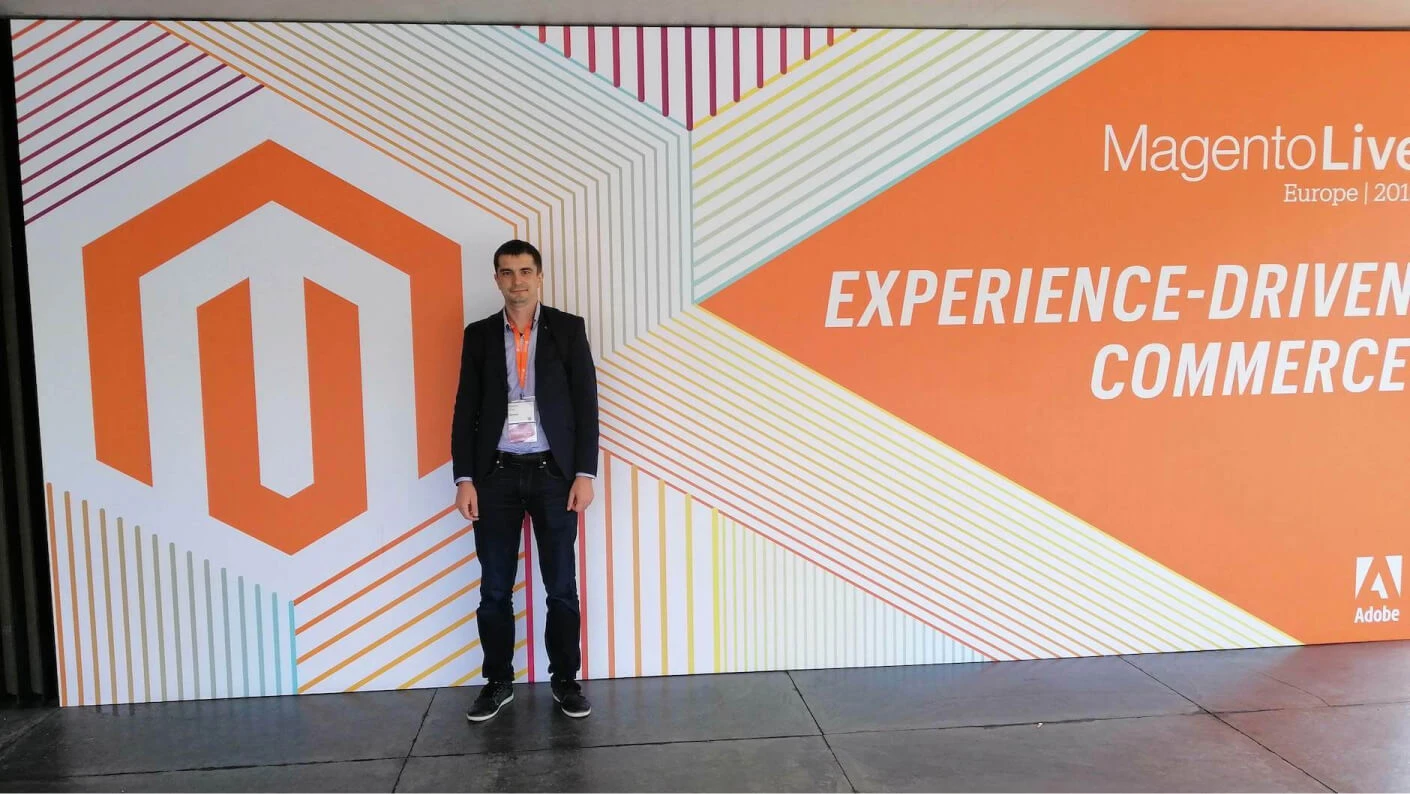
How did the company evolve after transitioning to Magento? How did you find clients, and did the team grow?
After transitioning to Magento, we barely needed to search for new clients actively—they found us. This was largely due to our high-quality products and strong presence on the Magento Marketplace.
Our Advanced Sphinx Search extension, developed by Oleksandr, held a leading position on the platform for several years and received excellent reviews. It consistently appeared on the marketplace’s front page in the "Top Rated Extensions" section, increasing our visibility and attracting new businesses.
We began working with clients from Europe, North and South America, Australia, India, and many other countries where PayPal payments were accepted.
We never engaged in traditional advertising. Instead, we focused on product quality and customer service. From the start, Oleksandr set a high standard for client communication, providing detailed consultations and gathering feedback directly through chat.
This approach helped us grow quickly. We soon realized that customer feedback and continuous quality improvement were the best forms of marketing.
"We never engaged in traditional advertising. Instead, we focused on product quality and customer service."
The company's growth was gradual. Mirasvit didn’t aim for rapid expansion, which could be seen as both an advantage and a disadvantage.
We started with a small team in one room in Kyiv and expanded to several rooms. Now, our team has grown to 30 employees working from different countries. We chose stable growth to maintain high work quality and ensure close connections within our international team.
What key factors contributed to your expertise development from 2009 to 2016?
During this period, we fully focused on developing modules for Magento. The market was open and growing rapidly, offering plenty of growth opportunities. Ideas for new extensions were practically everywhere—we just had to implement them.
We quickly realized that we enjoyed working on complex assets that weren’t cost-effective to develop as custom solutions for specific projects. These extensions solved large-scale problems and were more profitable to sell as ready-made products.
"We concentrated on what we did best and actively listened to our clients. Their requests and challenges helped us determine which service to develop next."
We learned not only to program and assist clients but also to delegate these tasks to our employees. While writing the code for an extension was relatively easy, teaching someone else to do it at the same level was much harder.
Scaling customer support, in particular, was challenging. It required employees to possess a wide range of skills: being Magento developers, having a good command of English, and displaying high levels of empathy and customer care. We spent much time and effort establishing acceptable processes in the company.
We gradually accumulated expertise: Mirasvit released new modules, improved existing ones, gathered feedback, and constantly learned through practice. We grew with the market, and our products became increasingly in demand among both new and returning clients.
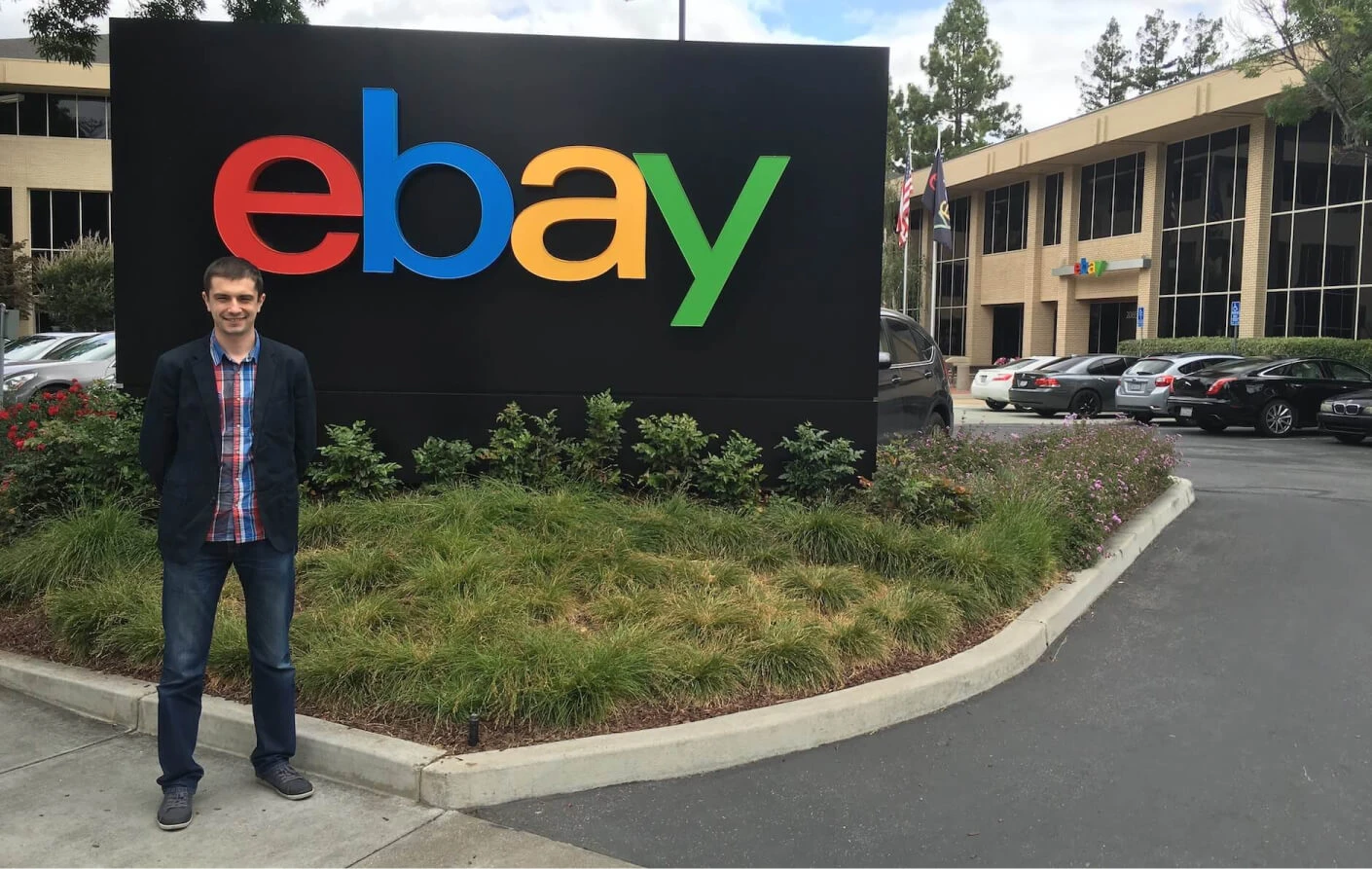
How did you manage the company’s processes?
One of the most challenging aspects has always been customer support. When it came time to hire more specialists, we faced the challenge of finding people who could provide technical support for our products and communicate with clients with the same level of empathy and professionalism.
To tackle this, Mirasvit implemented a multi-level customer support system—L1 and L2—where programmers work at each level.
Our employees are developers, allowing us to maintain a high level of technical expertise. Customers don't deal with sales managers who don’t understand what’s happening “under the hood”.
"We carefully planned each step of our customer interaction process, from testing new employees to their training and integration into the workflow. Finding the right people and creating conditions for them to provide high-quality service and solve complex client problems was crucial."
In 2016, you expanded your business by entering the Shopify ecosystem. What new challenges and opportunities did you encounter working with this platform compared to Magento?
Magento, especially Magento 2 (Adobe Commerce), remains an excellent platform for online stores, and we truly appreciate its capabilities. However, we strongly desired to try something completely new and step outside our comfort zone. Shopify attracted us because it’s a SaaS platform, and we saw it as a great opportunity to enter the SaaS world and gain expertise in this area.
At first, we experimented with creating simple applications for Shopify, but they didn’t yield significant results. That’s when we decided to leverage our experience with Magento and develop a high-quality search app for Shopify.
This turned out to be more challenging than we expected. The technologies Mirasvit had previously used weren’t well-suited for SaaS applications, or at least we weren’t satisfied with how they performed in this new context.
We had to change our approach several times, completely rewriting the app before we finally launched our first SaaS app—Omega Instant Search. This project pushed us through several stages of growth and scaling the architecture.
When the system crashed, a bot would call me in the middle of the night, and I’d wake up to restore it with my laptop in hand.
"The Shopify market was highly competitive, and breaking through was tough. The first few years with the search app were difficult, so we launched several more apps to diversify our offerings."
Unlike Magento clients, who are used to more complex customizations and development, Shopify clients have entirely different expectations and behavior. They expect instant solutions, ease of use, and immediate support. Any delay in resolving their issue could lead to negative reviews, strongly impacting the product’s success. We had to adapt to these nuances, but we managed.
Once our Shopify division stabilized and began generating steady income, we spun it into a separate unit focusing exclusively on this platform.
What key events occurred within the company after 2016?
Firstly, we created separate divisions within the company, each with its leader. This allowed us to manage projects more efficiently and focus on developing distinct areas like Magento and Shopify.
Secondly, we launched various employee motivation programs. It is important for the company’s continued growth to attract new talented specialists and maintain high levels of engagement and satisfaction among the existing team.
Around 2018, we realized we were struggling with scaling, particularly in customer support. We decided to hire a manager to help us establish proper processes. Eventually, one of the founders of Repka.ua, who already had experience in managing and scaling businesses, joined our team.
He helped us restructure the support department, hire a new manager, and build an effective management system. Although our paths eventually diverged, his insights into the need for creating departments and organizational structures were incredibly valuable.
Today, we have dedicated leaders for development, support, and other areas, allowing us to manage the company efficiently while maintaining high-quality standards.
Tell us about your team's role in this process. How have your employees developed over the years working for the company?
The team is the foundation of any organization. We’ve been fortunate to gather professionals who truly love what they do.
"For us, the key is that people enjoy coming to work, find joy in their tasks, and feel proud of their accomplishments. This principle guides the business directions and the employees we work with."
Most of our specialists have been with us for five or more years, and some since as early as 2008-2010. Many started as junior developers and, over time, grew into product managers, team leaders, and even heads of entire departments. Now, they are the ones recruiting new team members, adhering to the same values and philosophy that we do.
Yes, we bring in many people on trial, but only those who truly fit the company remain.
What approach to staffing do you prefer: training newcomers from scratch or hiring experienced professionals who can lead the team?
I like both approaches because they complement each other. When we hire newcomers, we can train them in our way of working from the ground up. If the person has the right attitude and motivation, they grow quickly and become an integral part of the team.
If we lack expertise in a particular area, we bring in experienced professionals who can not only integrate into the team but also bring new knowledge and teach us something new.
We carefully plan and prioritize the onboarding and training of new employees. We’ve developed a standard onboarding program that includes theoretical and practical training. Each new employee is assigned a mentor—an experienced developer with a high level of competency and empathy who helps them acquire all the necessary skills and knowledge.
The training starts with basic tasks and becomes more complex as the employee masters the material. They work on test projects, familiarize themselves with the architecture of our modules, and learn to solve real client issues. We emphasize developing technical and soft skills, such as communication, explaining complex concepts effectively, and understanding client needs.
"We look for people who possess the required technical skills but can also communicate clearly and friendly, prioritize effectively, and show genuine interest in solving clients’ problems."
The development of these skills continues even after hiring through ongoing training, knowledge sharing within the team, and manager feedback.
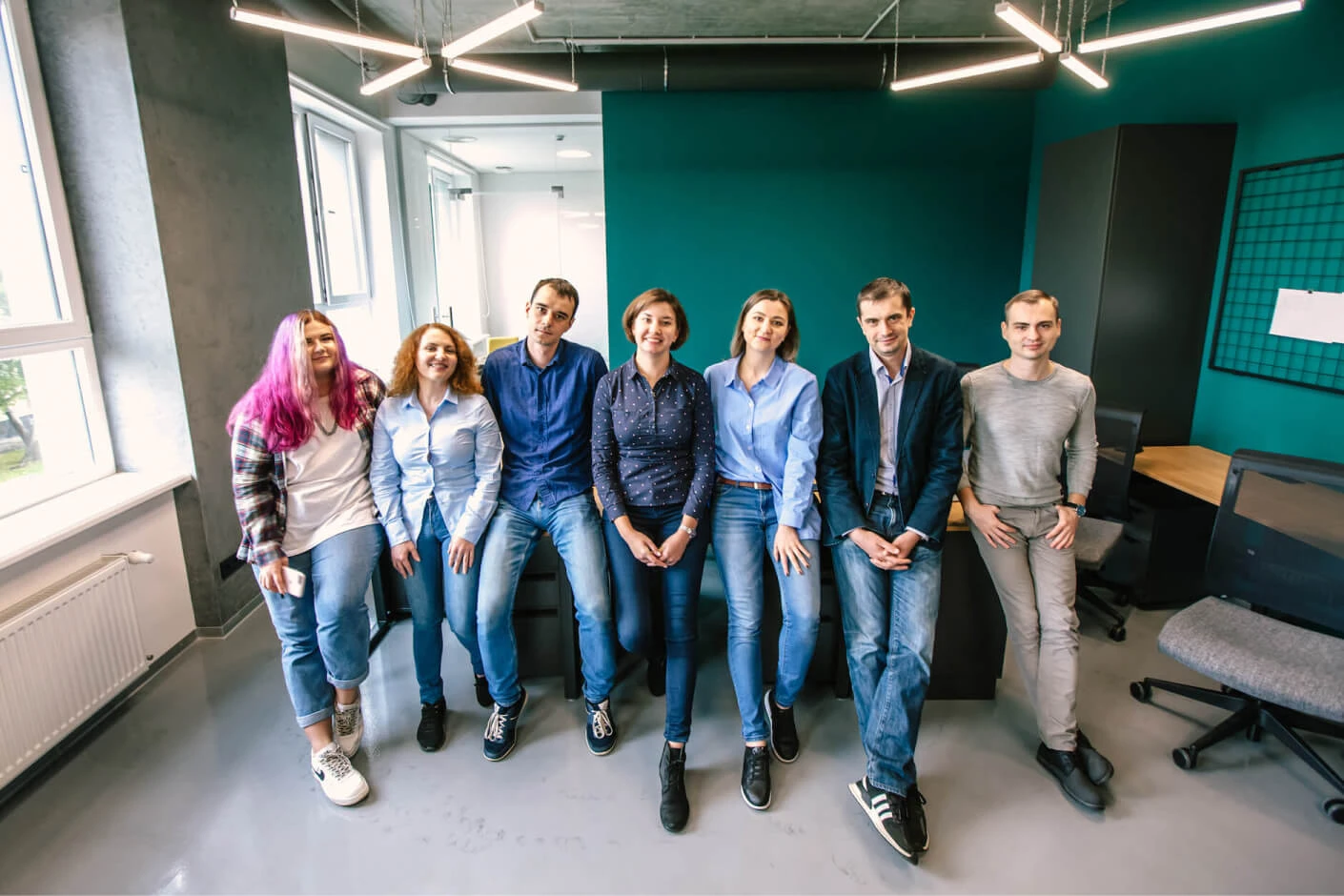
What methods and approaches do you use to attract, retain, and develop talent within Mirasvit?
After 2016, we began actively implementing programs to motivate and develop our employees. These programs include material and non-material incentives to boost engagement and team satisfaction.
Employee motivation at Mirasvit consists of two key components. The first is job satisfaction. If a person doesn’t enjoy what they do daily, no matter how much they’re paid, the results won’t be great. That’s why we pay close attention to ensuring that employees derive pleasure from their work.
When we bring someone new into the team, we observe how much they enjoy their tasks and how they feel during the work process. If they are genuinely interested, we know they’re a good fit. If the work causes tension, we understand that further collaboration won’t be productive.
The second component is financial motivation. Even if an employee loves their job, they need to see a direct link between their efforts and rewards. That’s why we’ve developed a system where salaries and bonuses are directly tied to performance. For example, in the Shopify division, employees receive bonuses based on the sales success of a particular app. If someone works in support and doesn’t directly impact sales, their bonus is tied to customer satisfaction.
This system significantly increased employee engagement. When people know that their efforts directly influence their income, they become more responsible and motivated. We don’t need to monitor their work constantly—they strive to do their best independently.
We also foster a culture of openness and mutual support within the company. This is reflected in the quick exchange of knowledge and experience and in ensuring that every employee feels valued and sees how their contributions contribute to the company’s success.
I’m not a big believer in all the "perks" that are often offered in benefits packages but rarely used by employees. What’s important to us is creating an environment where people can fully unleash their talents and feel energized by their work. In my opinion, that’s the best motivation you can offer.
In the competitive IT market, what do you believe is Mirasvit’s unique selling proposition? Why do clients and partners choose you over competitors?
The differences between Magento extensions from various vendors are becoming less distinct. Module features are very similar, and coming up with something new that isn’t quickly copied by competitors is becoming increasingly difficult. That’s why, from the beginning, we’ve focused on high-quality customer support, which remains our key differentiator and advantage.
"Understanding that the relationship doesn’t end after a product is purchased is important. Magento regularly releases updates, new versions of PHP come out, and clients need access to the latest versions of our extensions and sometimes our help."
Support service is difficult to scale and maintain at a high level. It heavily depends on people and requires significant effort. Support is critical in our business, especially in the Magento space. When clients purchase a module, they need help with installation and configuration, resolving conflicts with other extensions, and keeping it up-to-date as new platform versions are released.
Clients choose us not only for our features and pricing but also because they trust us and know we’ll support them for years to come.
One example of our philosophy is our commitment to long-term relationships with clients. When the Magento 2 was released, many vendors began selling their solutions as entirely new products for the updated platform. On the other hand, we decided that our clients who had already purchased our extensions would receive a free upgrade from Magento 1 to Magento 2. This reflects our philosophy of trust and care for the clients we work with in the long term.
Quality at every stage is a core value of your company. How do you ensure adherence to the highest quality standards from idea to product realization?
The quality of a product or service depends on each component's quality. This includes the entire development process—from writing code to testing it. We adhere to strict coding standards, perform mandatory code reviews, and use both automated and manual testing.
We've spent a long time building our current quality assurance processes. Along the way, we encountered mistakes and challenges, but we constantly analyzed them, improved our methods, and aimed to automate as many processes as possible to minimize human error.
How has observing competitors influenced your strategy and product development?
We don’t focus much on competitors. Our primary focus is on our clients and partners. Blindly copying competitors' features doesn’t bring real value. If a client tells us that our module lacks a certain feature, that's the most important signal for us to add it. Client needs should drive our efforts, not what other companies are doing.
We prefer not to follow competitors too closely to preserve our individuality. If we start copying others, we risk becoming like everyone else.
We also actively explore new technologies and consider how to apply them to our modules. Our approach is to remain unique and focus on real client requests rather than competitors' actions.
What advantages does collaboration with your partners bring to your business? How do you plan to develop these relationships in the future?
Partners play a huge role in our business. These are companies that develop professionally in the e-commerce space and are experts in their fields.
Because they interact closely with clients, they deeply understand the technologies and challenges they face.
"When we communicate with partners, we receive a wealth of valuable feedback on our modules—what works well, what can be improved, and how to make those improvements. This is extremely important because partners often test our solutions on multiple projects and can provide precise, actionable recommendations."
Unlike clients, who are primarily business owners and may not always understand the technical details, partners have a deep technical understanding and can offer expert advice on improving the product.
For example, if a partner uses our module on five or ten of their client's websites, they will be aware of all the nuances and issues that may arise and can suggest specific improvements.
Additionally, we must build long-term relationships with our partners. When partners recommend our module to their clients, they’re essentially vouching for us, impacting their reputation. Therefore, it’s important for us that the client remains satisfied after receiving our product.
What strategies do you use to expand your customer base and geographic reach? What new markets and areas do you plan to enter in the near future?
Clients come to us primarily for two reasons. First, they’ve already had a positive experience working with us on other projects, or someone has recommended us to them. Second, clients often find us through search engines if they hear about us for the first time. They compare our solutions with competitors, chat with us, try out our module, and if they like how we work, they purchase more products.
Our reputation is built on two key aspects: customer satisfaction and asset quality. We aim to ensure that our clients are happy and that our products are flawless—with minimal bugs, reliable performance, and clean code. This is especially important for developers who work with our solution and greatly appreciate the quality of our code.
Many buyers highlight in their reviews that our modules are crafted with high expertise, which is very important to us.
We recognize that our strength lies in technical expertise. We’re technical specialists, so our primary focus is on quality development and excellent customer service. While we’re open to developing our marketing efforts, we focus more on what we already do well and strive to strengthen these areas.
In the near future, we plan to concentrate on our current projects, as we see great potential in them. We’ll continue developing our Magento extensions line and release new items. We have some exciting ideas, and some are already being implemented.
How do you want your company to be perceived globally, and what steps are you taking to achieve this?
We’ve always aimed for our clients and partners to trust us and know they can rely on us. We want to be perceived as experts who help clients achieve the best business outcomes using our modules.
We don’t just sell extensions; we also offer free installation, customization to meet client needs, and free consultations in areas where we have deep expertise.
Whenever a new version of Magento is released, we promptly update our modules, ensuring clients can seamlessly upgrade their stores.
"We’re always ready to assist if any issues arise, even when the problem isn’t directly related to our solutions. Customer focus is our top priority, and we plan to maintain that moving forward."
Looking ahead, where do you see Mirasvit in five to ten years? What are your key strategic goals, and how do you plan to achieve them?
Planning for such a long term in the fast-changing world of technology is difficult, and the planning horizon is getting shorter. But one thing is certain—we will continue doing our best, developing our products, and supporting our clients at the highest level. We’ll adapt to changes and seek new growth opportunities to stay competitive and in demand in the market.
Right now, our focus is on growing our current projects, especially in the Shopify space. We are actively expanding our team, increasing the number of specialists, and developing new features and modules. At the same time, we continue to improve our solutions for Magento. We have ideas for creating new features and modules based on AI to enhance the user experience.
Additionally, Mirasvit is launching smaller test projects to gauge their potential for success. If they show promise, we’ll dedicate more resources to them.
Our strategy is to strengthen our current positions and not spread ourselves too thin by chasing new directions that could distract us from our main goals.
What would you do differently if you could return to the beginning of a certain point in your company’s development? What decisions or steps would you reconsider based on your accumulated experience?
I would have aimed to move faster, make more mistakes, take more risks, and accumulate more experience to advance to the next level more quickly.
"Initially, we didn’t fully understand how to invest in the company properly, find the right leaders, or build teams. Now, I realize that we should have learned more from those who had already gone through this journey and made quicker decisions regarding team expansion and company growth."
It has always been important for me to learn from people whose ideas and approaches resonate with me. When I find someone I admire for their thinking and strategies, I try to study everything they’ve done—their books, interviews, and articles.
I see tremendous value in this approach and am grateful to those who recommend good books or information sources.

